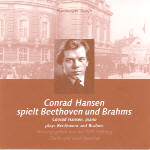Historic record mavens are most likely to know Conrad Hansen in his role as piano soloist in Mengelberg’s Berlin Philharmonic studio recording of the Tchaikovsky First Concerto, and via the wartime Beethoven Fourth Concerto broadcast with Furtwängler conducting. The recordings reveal Hansen’s warm, agreeable tone, adequate but not world class technique, and tasteful but rather workaday musical sensibility. Ditto for the present two discs respectfully devoted to Beethoven and Brahms broadcast performances from 1952-60. Beethoven’s Emperor Concerto, for instance, lacks necessary finger power and strength: witness Hansen’s rushed trills in the Rondo’s opening statement and his flustered octave playing in the first movement. Karl Böhm’s wonderful conducting, though, commands attention through his forward winds and sharply profiled rhythms. Of the two Beethoven Sonatas, Op. 10 No. 1’s slow movement stands out for rich voicings and lyric eloquence, and Op. 111’s long trills sound appropriately veiled and otherworldly. But I’m rather turned off by Hansen’s toothless rhythm when the going gets rough (Op. 111’s obsessive dotted rhythms, for instance), limited dynamic range, and numerous rubatos borne out of caution instead of conviction.
If the Brahms G minor Quartet is any indication, I suspect Hansen was a more responsive, suppler, and relaxed pianist when playing chamber music, although the present performance is a shade dour and straightlaced for such a red-blooded, forward-moving score. The gypsy-like finale never really takes wing, although the second movement’s fragile, exposed textures are beautifully shaped and colored (has the violin part ever sounded more like a clarinet?). Unfortunately, Hansen’s ultra-careful, prosaic reading of the Brahms F minor Sonata gives no hint of the music’s ambitious dimensions, and, to make matters worse, is pitched a half-step flat in E minor. Unless you’re an intrepid archivist with plenty of spending money and shelf space, you don’t really need this.
































